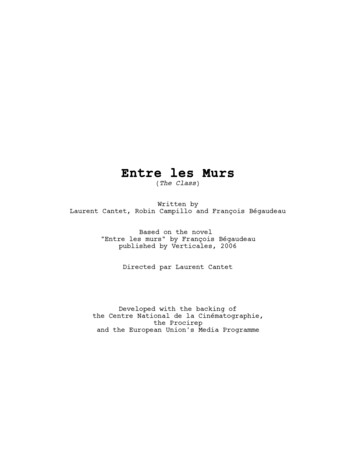
Transcription
Les MiserablesByVictor Hugo1
CONTENTSVOLUME IBOOK FIRST.--A JUST MANCHAPTERI. M. MyrielII. M. Myriel becomes M. WelcomeIII. A Hard Bishopric for a Good BishopIV. Works corresponding to WordsV. Monseigneur Bienvenu made his Cassocks last too longVI. Who guarded his House for himVII. CravatteVIII. Philosophy after DrinkingIX. The Brother as depicted by the SisterX. The Bishop in the Presence of an Unknown LightXI. A RestrictionXII. The Solitude of Monseigneur WelcomeXIII. What he believedXIV. What he thought2
BOOK SECOND.--THE FALLI. The Evening of a Day of WalkingII. Prudence counselled to WisdomIII. The Heroism of Passive ObedienceIV. Details concerning the Cheese-Dairies of PontarlierV. TranquillityVI. Jean ValjeanVII. The Interior of DespairVIII. Billows and ShadowsIX. New TroublesX. The Man arousedXI. What he doesXII. The Bishop worksXIII. Little Gervais3
BOOK THIRD.--IN THE YEAR 1817I. The Year 1817II. A Double QuartetteIII. Four and FourIV. Tholomyes is so Merry that he sings a Spanish DittyV. At BombardasVI. A Chapter in which they adore Each OtherVII. The Wisdom of TholomyesVIII. The Death of a HorseIX. A Merry End to Mirth4
BOOK FOURTH.--TO CONFIDE IS SOMETIMES TO DELIVER INTO A PERSON'SPOWERI. One Mother meets Another MotherII. First Sketch of Two Unprepossessing FiguresIII. The Lark5
BOOK FIFTH.--THE DESCENTI. The History of a Progress in Black Glass TrinketsII. MadeleineIII. Sums deposited with LaffitteIV. M. Madeleine in MourningV. Vague Flashes on the HorizonVI. Father FaucheleventVII. Fauchelevent becomes a Gardener in ParisVIII. Madame Victurnien expends Thirty Francs on MoralityIX. Madame Victurnien's SuccessX. Result of the SuccessXI. Christus nos LiberavitXII. M. Bamatabois's InactivityXIII. The Solution of Some Questions connected with theMunicipal Police6
BOOK SIXTH.--JAVERTI. The Beginning of ReposeII. How Jean may become Champ7
BOOK SEVENTH.--THE CHAMPMATHIEU AFFAIRI. Sister SimpliceII. The Perspicacity of Master ScaufflaireIII. A Tempest in a SkullIV. Forms assumed by Suffering during SleepV. HindrancesVI. Sister Simplice put to the ProofVII. The Traveller on his Arrival takes Precautionsfor DepartureVIII. An Entrance by FavorIX. A Place where Convictions are in Process of FormationX. The System of DenialsXI. Champmathieu more and more Astonished8
BOOK EIGHTH.--A COUNTER-BLOWI. In what Mirror M. Madeleine contemplates his HairII. Fantine HappyIII. Javert SatisfiedIV. Authority reasserts its RightsV. A Suitable Tomb9
VOLUME IIBOOK FIRST.--WATERLOOCHAPTERI. What is met with on the Way from NivellesII. HougomontIII. The Eighteenth of June, 1815IV. AV. The Quid Obscurum of BattlesVI. Four o'clock in the AfternoonVII. Napoleon in a Good HumorVIII. The Emperor puts a Question to the Guide LacosteIX. The UnexpectedX. The Plateau of Mont-Saint-JeanXI. A Bad Guide to Napoleon; a Good Guide to BulowXII. The GuardXIII. The CatastropheXIV. The Last SquareXV. CambronneXVI. Quot Libras in Duce?XVII. Is Waterloo to be considered Good?XVIII. A Recrudescence of Divine RightXIX. The Battle-Field at Night10
BOOK SECOND.--THE SHIP ORIONI. Number 24,601 becomes Number 9,430II. In which the reader will peruse Two Verses which areof the Devil's Composition possiblyIII. The Ankle-Chain must have undergone a Certain PreparatoryManipulation to be thus broken with a Blow from a Hammer11
BOOK THIRD.--ACCOMPLISHMENT OF THE PROMISE MADE TO THE DEADWOMANI. The Water Question at MontfermeilII. Two Complete PortraitsIII. Men must have Wine, and Horses must have WaterIV. Entrance on the Scene of a DollV. The Little One All AloneVI. Which possibly proves Boulatruelle's IntelligenceVII. Cosette Side by Side with the Stranger in the DarkVIII. The Unpleasantness of receiving into One's House a PoorMan who may be a Rich ManIX. Thenardier at his ManoeuvresX. He who seeks to better himself may render his Situation WorseXI. Number 9,430 reappears, and Cosette wins it in the Lottery12
BOOK FOURTH.--THE GORBEAU HOVELI. Master GorbeauII. A Nest for Owl and a WarblerIII. Two Misfortunes make One Piece of Good FortuneIV. The Remarks of the Principal TenantV. A Five-Franc Piece falls on the Ground and produces a Tumult13
BOOK FIFTH.--FOR A BLACK HUNT, A MUTE PACKI. The Zigzags of StrategyII. It is Lucky that the Pont d'Austerlitz bearsCarriagesIII. To Wit, the Plan of Paris in 1727IV. The Gropings of FlightV. Which would be Impossible with Gas LanternsVI. The Beginning of an EnigmaVII. Continuation of the EnigmaVIII. The Enigma becomes Doubly MysteriousIX. The Man with the BellX. Which explains how Javert got on the Scent14
BOOK SIXTH.--LE PETIT-PICPUSI. Number 62 Rue Petit-PicpusII. The Obedience of Martin VergaIII. AusteritiesIV. GayetiesV. DistractionsVI. The Little ConventVII. Some Silhouettes of this DarknessVIII. Post Corda LapidesIX. A Century under a GuimpeX. Origin of the Perpetual AdorationXI. End of the Petit-Picpus15
BOOK SEVENTH.--PARENTHESISI. The Convent as an Abstract IdeaII. The Convent as an Historical FactIII. On What Conditions One can respect the PastIV. The Convent from the Point of View of PrinciplesV. PrayerVI. The Absolute Goodness of PrayerVII. Precautions to be observed in BlameVIII. Faith, Law16
BOOK EIGHTH.--CEMETERIES TAKE THAT WHICH IS COMMITTED THEMI. Which treats of the Manner of entering a ConventII. Fauchelevent in the Presence of a DifficultyIII. Mother InnocenteIV. In which Jean Valjean has quite the Air of having readAustin CastillejoV. It is not Necessary to be Drunk in order to be ImmortalVI. Between Four PlanksVII. In which will be found the Origin of the Saying: Don'tlose the CardVIII. A Successful InterrogatoryIX. Cloistered17
VOLUME IIIBOOK FIRST.--PARIS STUDIED IN ITS ATOMI. ParvulusII. Some of his Particular CharacteristicsIII. He is AgreeableIV. He may be of UseV. His FrontiersVI. A Bit of HistoryVII. The Gamin should have his Place in the Classificationsof IndiaVIII. In which the Reader will find a Charming Saying of theLast KingIX. The Old Soul of GaulX. Ecce Paris, ecce HomoXI. To Scoff, to ReignXII. The Future Latent in the PeopleXIII. Little Gavroche18
BOOK SECOND.--THE GREAT BOURGEOISI. Ninety Years and Thirty-two TeethII. Like Master, Like HouseIII. Luc-EspritIV. A Centenarian AspirantV. Basque and NicoletteVI. In which Magnon and her Two Children are seenVII. Rule: Receive No One except in the EveningVIII. Two do not make a Pair19
BOOK THIRD.--THE GRANDFATHER AND THE GRANDSONI. An Ancient SalonII. One of the Red Spectres of that EpochIII. RequiescantIV. End of the BrigandV. The Utility of going to Mass, in order to become aRevolutionistVI. The Consequences of having met a WardenVII. Some PetticoatVIII. Marble against Granite20
BOOK FOURTH.--THE FRIENDS OF THE ABCI. A Group which barely missed becoming HistoricII. Blondeau's Funeral Oration by BossuetIII. Marius' AstonishmentsIV. The Back Room of the Cafe MusainV. Enlargement of HorizonVI. Res Angusta21
BOOK FIFTH.--THE EXCELLENCE OF MISFORTUNEI. Marius IndigentII. Marius PoorIII. Marius Grown UpIV. M. MabeufV. Poverty a Good Neighbor for MiseryVI. The Substitute22
BOOK SIXTH.--THE CONJUNCTION OF TWO STARSI. The Sobriquet; Mode of Formation of Family NamesII. Lux Facta EstIII. Effect of the SpringIV. Beginning of a Great MaladyV. Divers Claps of Thunder fall on Ma'am BougonVI. Taken PrisonerVII. Adventures of the Letter U delivered over to ConjecturesVIII. The Veterans themselves can be HappyIX. Eclipse23
BOOK SEVENTH.--PATRON MINETTEI. Mines and MinersII. The Lowest DepthsIII. Babet, Gueulemer, Claquesous, and MontparnasseIV. Composition of the Troupe24
BOOK EIGHTH.--THE WICKED POOR MANI. Marius, while seeking a Girl in a Bonnet encounters aMan in a CapII. Treasure TroveIII. QuadrifronsIV. A Rose in MiseryV. A Providential Peep-HoleVI. The Wild Man in his LairVII. Strategy and TacticsVIII. The Ray of Light in the HovelIX. Jondrette comes near WeepingX. Tariff of Licensed Cabs, Two Francs an HourXI. Offers of Service from Misery to WretchednessXII. The Use made of M. Leblanc's Five-Franc PieceXIII. Solus cum Solo, in Loco Remoto, non cogitabunturorare Pater NosterXIV. In which a Police Agent bestows Two Fistfuls on a LawyerXV. Jondrette makes his PurchasesXVI. In which will be found the Words to an English Airwhich was in Fashion in 1832XVII. The Use made of Marius' Five-Franc PieceXVIII. Marius' Two Chairs form a Vis-a-VisXIX. Occupying One's Self with Obscure DepthsXX. The TrapXXI. One should always begin by arresting the Victims25
XXII. The Little One who was crying in Volume Two26
VOLUME IVBOOK FIRST.--A FEW PAGES OF HISTORYI. Well CutII. Badly SewedIII. Louis PhilippeIV. Cracks beneath the FoundationV. Facts whence History springs and which History ignoresVI. Enjolras and his Lieutenants27
BOOK SECOND.--EPONINEI. The Lark's MeadowII. Embryonic Formation of Crimes in the Incubation of PrisonsIII. Apparition to Father MabeufIV. An Apparition to Marius28
BOOK THIRD.--THE HOUSE IN THE RUE PLUMETI. The House with a SecretII. Jean Valjean as a National GuardIII. Foliis ac FrondibusIV. Change of GateV. The Rose perceives that it is an Engine of WarVI. The Battle BegunVII. To One Sadness oppose a Sadness and a HalfVIII. The Chain-Gang29
BOOK FOURTH.--SUCCOR FROM BELOW MAY TURN OUT TO BE SUCCORFROM ON HIGHI. A Wound without, Healing withinII. Mother Plutarque finds no Difficulty in explaining a Phenomenon30
BOOK FIFTH.--THE END OF WHICH DOES NOT RESEMBLE THE BEGINNINGI. Solitude and Barracks CombinedII. Cosette's ApprehensionsIII. Enriched with Commentaries by ToussaintIV. A Heart beneath a StoneV. Cosette after the LetterVI. Old People are made to go out opportunely31
BOOK SIXTH.--LITTLE GAVROCHEI. The Malicious Playfulness of the WindII. In which Little Gavroche extracts Profit from Napoleon the GreatIII. The Vicissitudes of Flight32
BOOK SEVENTH.--SLANGI. OriginII. RootsIII. Slang which weeps and Slang which laughsIV. The Two Duties: To Watch and to Hope33
BOOK EIGHTH.--ENCHANTMENTS AND DESOLATIONSI. Full LightII. The Bewilderment of Perfect HappinessIII. The Beginning of ShadowIV. A Cab runs in English and barks in SlangV. Things of the NightVI. Marius becomes Practical once more to the Extent ofGiving Cosette his AddressVII. The Old Heart and the Young Heart in the Presenceof Each Other34
BOOK NINTH.--WHITHER ARE THEY GOING?I. Jean ValjeanII. MariusIII. M. Mabeuf35
BOOK TENTH.--THE 5TH OF JUNE, 1832I. The Surface of the QuestionII. The Root of the MatterIII. A Burial; an Occasion to be born againIV. The Ebullitions of Former DaysV. Originality of Paris36
BOOK ELEVENTH.--THE ATOM FRATERNIZES WITH THE HURRICANEI. Some Explanations with Regard to the Origin of Gavroche'sPoetry. The Influence of an Academician on this PoetryII. Gavroche on the MarchIII. Just Indignation of a Hair-dresserIV. The Child is amazed at the Old ManV. The Old ManVI. Recruits37
BOOK TWELFTH.--CORINTHEI. History of Corinthe from its FoundationII. Preliminary GayetiesIII. Night begins to descend upon GrantaireIV. An Attempt to console the Widow HucheloupV. PreparationsVI. WaitingVII. The Man recruited in the Rue des BillettesVIII. Many Interrogation Points with Regard to a CertainLe Cabuc, whose Name may not have been Le Cabuc38
BOOK THIRTEENTH.--MARIUS ENTERS THE SHADOWI. From the Rue Plumet to the Quartier Saint-DenisII. An Owl's View of ParisIII. The Extreme Edge39
BOOK FOURTEENTH.--THE GRANDEURS OF DESPAIRI. The Flag: Act FirstII. The Flag: Act SecondIII. Gavroche would have done better to accept Enjolras' CarbineIV. The Barrel of PowderV. End of the Verses of Jean ProuvaireVI. The Agony of Death after the Agony of LifeVII. Gavroche as a Profound Calculator of Distances40
BOOK FIFTEENTH.--THE RUE DE L'HOMME ARMEI. A Drinker is a BabblerII. The Street Urchin an Enemy of LightIII. While Cosette and Toussaint are AsleepIV. Gavroche's Excess of Zeal41
VOLUME VBOOK FIRST.--THE WAR BETWEEN FOUR WALLSI. The Charybdis of the Faubourg Saint-Antoine and theScylla of the Faubourg du TempleII. What Is to Be Done in the Abyss if One Does Not ConverseIII. Light and ShadowIV. Minus Five, Plus OneV. The Horizon Which One Beholds from the Summit of a BarricadeVI. Marius Haggard, Javert LaconicVII. The Situation Becomes AggravatedVIII. The Artillery-men Compel People to Take Them SeriouslyIX. Employment of the Old Talents of a Poacher and ThatInfallible Marksmanship Which Influenced theCondemnation of 1796X. DawnXI. The Shot Which Misses Nothing and Kills No OneXII. Disorder a Partisan of OrderXIII. Passing GleamsXIV. Wherein Will Appear the Name of Enjolras' MistressXV. Gavroche OutsideXVI. How from a Brother One Becomes a FatherXVII. Mortuus Pater Filium Moriturum ExpectatXVIII. The Vulture Becomes PreyXIX. Jean Valjean Takes His Revenge42
XX. The Dead Are in the Right and the Living Are Not in the WrongXXI. The HeroesXXII. Foot to FootXXIII. Orestes Fasting and Pylades DrunkXXIV. Prisoner43
BOOK SECOND.--THE INTESTINE OF THE LEVIATHANI. The Land Impoverished by the SeaII. Ancient History of the SewerIII. BruneseauIV. BruneseauV. Present ProgressVI. Future Progress44
BOOK THIRD.--MUD BUT THE SOULI. The Sewer and Its SurprisesII. ExplanationIII. The "Spun" ManIV. He Also Bears His CrossV. In the Case of Sand, as in That of Woman, There Is aFineness Which Is TreacherousVI. The FontisVII. One Sometimes Runs Aground When One Fancies ThatOne Is DisembarkingVIII. The Torn Coat-TailIX. Marius Produces on Some One Who Is a Judge of theMatter, the Effect of Being DeadX. Return of the Son Who Was Prodigal of His LifeXI. Concussion in the AbsoluteXII. The Grandfather45
BOOK FOURTH.--JAVERT DERAILEDI. Javert46
BOOK FIFTH.--GRANDSON AND GRANDFATHERI. In Which the Tree with the Zinc Plaster Appears AgainII. Marius, Emerging from Civil War, Makes Ready forDomestic WarIII. Marius AttackedIV. Mademoiselle Gillenormand Ends by No Longer ThinkingIt a Bad Thing That M. Fauchelevent Should HaveEntered With Something Under His ArmV. Deposit Your Money in a Forest Rather than with a NotaryVI. The Two Old Men Do Everything, Each One After HisOwn Fashion, to Render Cosette HappyVII. The Effects of Dreams Mingled with HappinessVIII. Two Men Impossible to Find47
BOOK SIXTH.--THE SLEEPLESS NIGHTI. The 16th of February, 1833II. Jean Valjean Still Wears His Arm in a SlingIII. The InseparableIV. The Immortal Liver48
BOOK SEVENTH.--THE LAST DRAUGHT FROM THE CUPI. The Seventh Circle and the Eighth HeavenII. The Obscurities Which a Revelation Can Contain49
BOOK EIGHTH.--FADING AWAY OF THE TWILIGHTI. The Lower ChamberII. Another Step BackwardsIII. They Recall the Garden of the Rue PlumetIV. Attraction and Extinction50
BOOK NINTH.--SUPREME SHADOW, SUPREME DAWNI. Pity for the Unhappy, but Indulgence for the HappyII. Last Flickerings of a Lamp Without OilIII. A Pen Is Heavy to the Man Who Lifted theFauchelevent's CartIV. A Bottle of Ink Which Only Succeeded in WhiteningV. A Night Behind Which There Is DayVI. The Grass Covers and the Rain Effaces51
LES MISERABLESVOLUME I.--FANTINE.PREFACESo long as there shall exist, by virtue of law and custom, decrees ofdamnation pronounced by society, artificially creating hells amid thecivilization of earth, and adding the element of human fate to divinedestiny; so long as the three great problems of the century--thedegradation of man through pauperism, the corruption of woman throughhunger, the crippling of children through lack of light--are unsolved;so long as social asphyxia is possible in any part of the world;--inother words, and with a still wider significance, so long as ignoranceand poverty exist on earth, books of the nature of Les Miserables cannotfail to be of use.HAUTEVILLE HOUSE, 1862.52
FANTINEBOOK FIRST--A JUST MANCHAPTER I--M. MYRIELIn 1815, M. Charles-Francois-Bienvenu Myriel was Bishop of D---- He wasan old man of about seventy-five years of age; he had occupied the seeof D---- since 1806.Although this detail has no connection whatever with the real substanceof what we are about to relate, it will not be superfluous, if merelyfor the sake of exactness in all points, to mention here the variousrumors and remarks which had been in circulation about him from the verymoment when he arrived in the diocese. True or false, that which is saidof men often occupies as important a place in their lives, and above all53
in their destinies, as that which they do. M. Myriel was the son of acouncillor of the Parliament of Aix; hence he belonged to the nobilityof the bar. It was said that his father, destining him to be the heir ofhis own post, had married him at a very early age, eighteen or twenty,in accordance with a custom which is rather widely prevalent inparliamentary families. In spite of this marriage, however, it was saidthat Charles Myriel created a great deal of talk. He was well formed,though rather short in stature, elegant, graceful, intelligent; thewhole of the first portion of his life had been devoted to the world andto gallantry.The Revolution came; events succeeded each other with precipitation; theparliamentary families, decimated, pursued, hunted down, were dispersed.M. Charles Myriel emigrated to Italy at the very beginning of theRevolution. There his wife died of a malady of the chest, from which shehad long suffered. He had no children. What took place next in the fateof M. Myriel? The ruin of the French society of the olden days, the fallof his own family, the tragic spectacles of '93, which were, perhaps,even more alarming to the emigrants who viewed them from a distance,with the magnifying powers of terror,--did these cause the ideas ofrenunciation and solitude to germinate in him? Was he, in the midst ofthese distractions, these affections which absorbed his life, suddenlysmitten with one of those mysterious and terrible blows which sometimesoverwhelm, by striking to his heart, a man whom public catastropheswould not shake, by striking at his existence and his fortune? No onecould have told: all that was known was, that when he returned from54
Italy he was a priest.In 1804, M. Myriel was the Cure of B---- [Brignolles]. He was alreadyadvanced in years, and lived in a very retired manner.About the epoch of the coronation, some petty affair connected withhis curacy--just what, is not precisely known--took him to Paris.Among other powerful persons to whom he went to solicit aid for hisparishioners was M. le Cardinal Fesch. One day, when the Emperorhad come to visit his uncle, the worthy Cure, who was waiting in theanteroom, found himself present when His Majesty passed. Napoleon,on finding himself observed with a certain curiosity by this old man,turned round and said abruptly:--"Who is this good man who is staring at me?""Sire," said M. Myriel, "you are looking at a good man, and I at a greatman. Each of us can profit by it."That very evening, the Emperor asked the Cardinal the name of the Cure,and some time afterwards M. Myriel was utterly astonished to learn thathe had been appointed Bishop of D----What truth was there, after all, in the stories which were invented asto the early portion of M. Myriel's life? No one knew. Very few familieshad been acquainted with the Myriel family before the Revolution.55
M. Myriel had to undergo the fate of every newcomer in a little town,where there are many mouths which talk, and very few heads which think.He was obliged to undergo it although he was a bishop, and becausehe was a bishop. But after all, the rumors with which his namewas connected were rumors only,--noise, sayings, words; less thanwords--palabres, as the energetic language of the South expresses it.However that may be, after nine years of episcopal power and ofresidence in D----, all the stories and subjects of conversation whichengross petty towns and petty people at the outset had fallen intoprofound oblivion. No one would have dared to mention them; no one wouldhave dared to recall them.M. Myriel had arrived at D---- accompanied by an elderly spinster,Mademoiselle Baptistine, who was his sister, and ten years his junior.Their only domestic was a female servant of the same age as MademoiselleBaptistine, and named Madame Magloire, who, after having been theservant of M. le Cure, now assumed the double title of maid toMademoiselle and housekeeper to Monseigneur.Mademoiselle Baptistine was a long, pale, thin, gentle creature; sherealized the ideal expressed by the word "respectable"; for it seemsthat a woman must needs be a mother in order to be venerable. Shehad never been pretty; her whole life, which had been nothing but a56
succession of holy deeds, had finally conferred upon her a sort ofpallor and transparency; and as she advanced in years she had acquiredwhat may be called the beauty of goodness. What had been leanness inher youth had become transparency in her maturity; and this diaphaneityallowed the angel to be seen. She was a soul rather than a virgin. Herperson seemed made of a shadow; there was hardly sufficient body toprovide for sex; a little matter enclosing a light; large eyes foreverdrooping;--a mere pretext for a soul's remaining on the earth.Madame Magloire was a little, fat, white old woman, corpulent andbustling; always out of breath,--in the first place, because of heractivity, and in the next, because of her asthma.On his arrival, M. Myriel was installed in the episcopal palace withthe honors required by the Imperial decrees, which class a bishopimmediately after a major-general. The mayor and the president paid thefirst call on him, and he, in turn, paid the first call on the generaland the prefect.The installation over, the town waited to see its bishop at work.57
CHAPTER II--M. MYRIEL BECOMES M. WELCOMEThe episcopal palace of D---- adjoins the hospital.The episcopal palace was a huge and beautiful house, built of stone atthe beginning of the last century by M. Henri Puget, Doctor of Theologyof the Faculty of Paris, Abbe of Simore, who had been Bishop of D---- in1712. This palace was a genuine seignorial residence. Everything aboutit had a grand air,--the apartments of the Bishop, the drawing-rooms,the chambers, the principal courtyard, which was very large, with walksencircling it under arcades in the old Florentine fashion, and gardensplanted with magnificent trees. In the dining-room, a long and superbgallery which was situated on the ground-floor and opened on thegardens, M. Henri Puget had entertained in state, on July 29, 1714, MyLords Charles Brulart de Genlis, archbishop; Prince d'Embrun; Antoinede Mesgrigny, the capuchin, Bishop of Grasse; Philippe de Vendome, GrandPrior of France, Abbe of Saint Honore de Lerins; Francois de Berton deCrillon, bishop, Baron de Vence; Cesar de Sabran de Forcalquier, bishop,Seignor of Glandeve; and Jean Soanen, Priest of the Oratory, preacher inordinary to the king, bishop, Seignor of Senez. The portraits of theseseven reverend personages decorated this apartment; and this memorabledate, the 29th of July, 1714, was there engraved in letters of gold on atable of white marble.The hospital was a low and narrow building of a single story, with a58
small garden.Three days after his arrival, the Bishop visited the hospital. The visitended, he had the director requested to be so good as to come to hishouse."Monsieur the director of the hospital," said he to him, "how many sickpeople have you at the present moment?""Twenty-six, Monseigneur.""That was the number which I counted," said the Bishop."The beds," pursued the director, "are very much crowded against eachother.""That is what I observed.""The halls are nothing but rooms, and it is with difficulty that the aircan be changed in them.""So it seems to me.""And then, when there is a ray of sun, the garden is very small for theconvalescents."59
"That was what I said to myself.""In case of epidemics,--we have had the typhus fever this year; wehad the sweating sickness two years ago, and a hundred patients attimes,--we know not what to do.""That is the thought which occurred to me.""What would you have, Monseigneur?" said the director. "One must resignone's self."This conversation took place in the gallery dining-room on theground-floor.The Bishop remained silent for a moment; then he turned abruptly to thedirector of the hospital."Monsieur," said he, "how many beds do you think this hall alone wouldhold?""Monseigneur's dining-room?" exclaimed the stupefied director.The Bishop cast a glance round the apartment, and seemed to be takingmeasures and calculations with his eyes."It would hold full twenty beds," said he, as though speaking to60
himself. Then, raising his voice:--"Hold, Monsieur the director of the hospital, I will tell you something.There is evidently a mistake here. There are thirty-six of you, in fiveor six small rooms. There are three of us here, and we have room forsixty. There is some mistake, I tell you; you have my house, and I haveyours. Give me back my house; you are at home here."On the following day the thirty-six patients were installed in theBishop's palace, and the Bishop was settled in the hospital.M. Myriel had no property, his family having been ruined by theRevolution. His sister was in receipt of a yearly income of five hundredfrancs, which sufficed for her personal wants at the vicarage. M. Myrielreceived from the State, in his quality of bishop, a salary of fifteenthousand francs. On the very day when he took up his abode in thehospital, M. Myriel settled on the disposition of this sum once forall, in the following manner. We transcribe here a note made by his ownhand:--NOTE ON THE REGULATION OF MY HOUSEHOLD EXPENSES.For the little seminary . . . . . . . . . . . . . .1,500 livresSociety of the mission . . . . . . . . . . . . . .For the Lazarists of Montdidier . . . . . . . . . .61100 "100 "
Seminary for foreign missions in Paris . . . . . .Congregation of the Holy Spirit . . . . . . . . . .200 "150 "Religious establishments of the Holy Land . . . . .Charitable maternity societies . . . . . . . . . .Extra, for that of Arles . . . . . . . . . . . . .100 "300 "50 "Work for the amelioration of prisons . . . . . . .Work for the relief and delivery of prisoners . . .400 "500 "To liberate fathers of families incarcerated for debt 1,000 "Addition to the salary of the poor teachers of thediocese . . . . . . . . . . . . . . . . . . .2,000 "Public granary of the Hautes-Alpes . . . . . . . .100 "Congregation of the ladies of D----, of Manosque, and ofSisteron, for the gratuitous instruction of poorgirls . . . . . . . . . . . . . . . . . . . .1,500 "For the poor . . . . . . . . . . . . . . . . . . .6,000 "My personal expenses . . . . . . . . . . . . . . .1,000 "-----Total . . . . . . . . . . . . . . . . . . . . 15,000 "M. Myriel made no change in this arrangement during the entire periodthat he occupied the see of D---- As has been seen, he called itregulating his household expenses.This arrangement was accepted with absolute submission by MademoiselleBaptistine. This holy woman regarded Monseigneur of D---- as at one and62
the same time her brother and her bishop, her friend according to theflesh and her superior according to the Church. She simply loved andvenerated him. When he spoke, she bowed; when he acted, she yielded heradherence. Their only servant, Madame Magloire, grumbled a little. Itwill be observed that Monsieur the Bishop had reserved for himselfonly one thousand livres, which, added to the pension of MademoiselleBaptistine, made fifteen hundred francs a year. On these fifteen hundredfrancs these two old women and the old man subsisted.And when a village curate came to D----, the Bishop still found means toentertain him, thanks to the severe economy of Madame Magloire, and tothe intelligent administration of Mademoiselle Baptistine.One day, after he had been in D---- about three months, the Bishopsaid:--"And still I am quite cramped with it all!""I should think so!" exclaimed Madame Magloire. "Monseigneur has noteven claimed the allowance which the department owes him for the expenseof his carriage in town, and for his journeys about the diocese. It wascustomary for bishops in former days.""Hold!" cried the Bishop, "you are quite right, Madame Magloire."And he made his demand.63
Some time afterwards the General Council took this demand underconsideration, and voted him an annual sum of three thousand francs,under this heading: Allowance to M. the Bishop for expenses of carriage,expenses of posting, and expenses of pastoral visits.This provoked a great outcry among the local burgesses; and a senatorof the Empire, a former member of the Council of the Five Hundredwhich favored the 18 Brumaire, and who was provided with a magnificentsenatorial office in the vicinity of the town of D----, wrote to M.Bigot de Preameneu, the minister of public worship, a very angry andconfidential note on the subject, from which we extract these authenticlines:--"Expenses of carriage? What can be done with it in a town of less thanfour thousand inhabitants? Expenses of journeys? What is the useof these trips, in the first place? Next, how can the posting beaccomplished in these mountainous parts? There are no roads. No onetravels otherwise than on horseback. Even the bridge between Durance andChateau-Arnoux can barely support ox-teams. These priests are all thus,greedy and avaricious. This man played the good priest when hefirst came. Now he does like the rest; he must have a carriage and aposting-chaise, he must have luxuries, like the bishops of the oldendays. Oh, all this priesthood! Things will not go well, M. le Comte,until the Emperor has freed us from these black-capped rascals. Downwith the Pope! [Matters were getting embroiled with Rome.] For my part,64
I am for Caesar alone." Etc., etc.On the other hand, this aff
10 VOLUME II BOOK FIRST.--WATERLOO CHAPTER I. What is met with on the Way from Niv











![FLOW TEMP. CONTROLLER [MASTER] (Cased) - mitsubishi-les.info](/img/6/im-ib-bh79d499h02-pac-if061-62-63b-e.jpg)